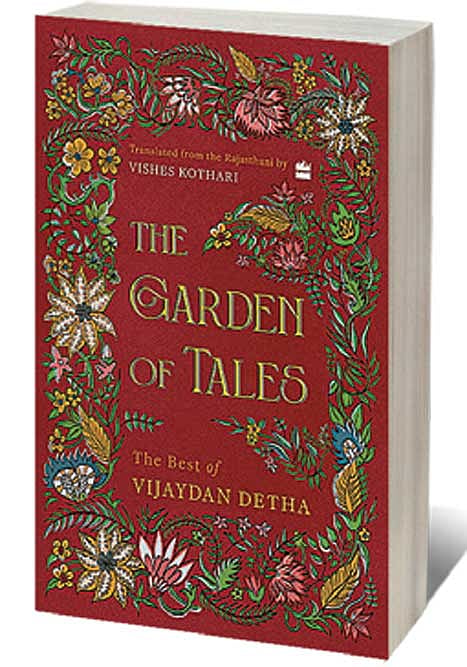Saint and Sinner

VIJAYDAN DETHA, FONDLY known as Bijji, is arguably the most important writer of Rajasthani prose. He turned to folklore for inspiration and unearthed unique stories and fables from in and around his village, Borunda, in Jodhpur. Several of Detha’s stories have been adapted into movies, such as Mani Kaul’s Duvidha, Amol Palekar’s Paheli, Pushpendra Singh’s Lajwanti, and Habib Tanvir’s well-known play Charandas Chor. The tale of Lajwanti finds its way into Vishes Kothari’s latest translation of Detha’s short stories, compiled as The Garden of Tales. Kothari peppers the prose with Rajasthani words from the original to bring readers as close as possible to the stories.
In ‘Lajwanti’, Detha promotes women’s agency as the married titular character drops her shyness and moral conservatism towards the end and pays heed to her innermost desire. But agency is also misused by some women, as captured in ‘Repayment’, in which a married woman’s stubbornness leads to a monk losing his eyes. And in ‘Only I Can Say No’, a mother-in-law exerts her dominance by hitting her daughter-in-law for denying alms to a monk, and subsequently asks him to get out herself.
Detha was an astute observer, and his prose is imbued with the various hues of human nature. The good, the bad, and the ugly aspects of society are laid bare in his work. Greed, corruption, and moral decadence are recurring themes in his stories. In ‘Power’, the reader is made aware of the self-serving nature of the masses, whose ever-changing loyalty is solely dictated by the figure of authority. In ‘The Father of Sin’, greed makes the Rajguru (royal priest) commit several sins before he realises that the answer to his question is hidden in his actions. ‘In the Donkey’s Skin’ is another quirky tale in which a queen, upon learning that her son-in-law is Lord Inder’s son in the form of a donkey, becomes greedy. Her arrogance leads to irreversible tragedy. But cleverness doesn’t always end badly. The protagonists of ‘The Crafty Jaat’ and ‘Mortgage of the Next Birth’ succeed in outsmarting their adversaries.
Imran Khan: Pakistan’s Prisoner
27 Feb 2026 - Vol 04 | Issue 60
The descent and despair of Imran Khan
In Detha’s stories, more often than not, ego, materialism, and the lust for power seal the fate of the protagonists. The old Beendraja (groom) of ‘Hollow Pride’ drinks pots of water in the biting cold after hearing a snide remark about his age. This act of false bravado proves fatal. In ‘The Dove and the King’, a dove manages to puncture the ego of a king by mocking him. In one of Detha’s best stories, ‘Aasmaan Jogi’, the high headedness of the seemingly immortal celestial being proves to be his downfall. The heated interaction between him and one of the women in his custody is intellectually stimulating and challenges societal moral norms. In ‘New Birth’ and ‘Jaraav Masi’s Tales’, a mysterious narrator regales Detha and others with fabled tales. Both of these moral lessons highlight the catastrophic impact of succumbing to the evils of materialism.
The might of truth is challenged by the force of power in ‘The Truthful Thief’. The tragic story is a stark reflection of the dark reality of the world, where cunning godmen thrive on the credulity of people and devotees who are bound by vows to their master end up suffering. Detha critiques the unholy nexus between royalty and priests. But not always does corruption triumph over goodness and honesty. The titular protagonist of ‘Kanha the Cowherd’ leads a simple life amidst cows and nature’s beauty. In the end, it is love that prevails over shallow materialism.
Kothari saves the best for last. Detha’s masterful ‘The Creed of Crows’ is a comprehensive portrait of the nuances of society. It navigates a woman’s travails in a patriarchal society where the people closest to her disown her. Left with no other choice for survival, she is compelled to enter the flesh trade. This exposes her to the hypocrisy and darkness of society’s so-called respected men. With a chilling ending, it qualifies as one of the most heart-wrenching stories about the ugliness of the world.

